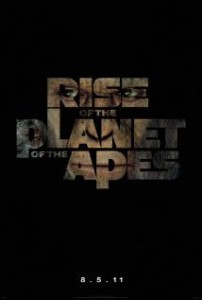 Because I can be a tiresome pedant, I’d like to note that we are currently living on the “planet of the apes.” Humans are apes. Except to those less-evolved hominids who believe that their imaginary friend magicked up the Earth, firmaments and all its inhabitants in seven days. (If you’re one of those, why are your here, reading this blog? Shoo!)
Because I can be a tiresome pedant, I’d like to note that we are currently living on the “planet of the apes.” Humans are apes. Except to those less-evolved hominids who believe that their imaginary friend magicked up the Earth, firmaments and all its inhabitants in seven days. (If you’re one of those, why are your here, reading this blog? Shoo!)
I confess, I never saw the original Planet of the Apes movie. I know–hang my head in shame–how can I call myself a geek? (I did see the Tim Burton reboot, which sucked monkey balls.) But based on what I’ve gleaned from Wikipedia and the few scenes from the original that I have seen, Rise of the Planet of the Apes is a splendid prequel.
James Franco plays Will Rodman, the earnest young scientist in search of a cure for Alzheimer’s. His is a personal quest, as his father, Charles (John Lithgow) suffers from the disease. Hope, however, shines bright on the horizon with Will’s pharmaceutical masterpiece, ALZ-113. The first test subject, a chimp known as number 9, displays amazing cognitive abilities after being given the drug, solving a puzzle which probably would challenge many Homo sapiens. Will brings the news to his boss, Jacobs (David Oyelowo) and they prepare to unveil the drug to stockholders, investors and other money types.
Then, disaster strikes. Chimp 9 goes bananas, rampaging through the test facility and eventually being shot dead. Jacobs is furious and demands that all the chimps be euthanasized, all further tests canceled. Only after every adult chimp has been killed, is the cause of 9’s aggression found. Nine had a baby and she was being over-protective. Here’s the first of few plot holes: there’s no way, in a test environment, where the animals are poked, prodded and examined, that the pregnancy would go unnoticed.
But look, cute baby CG chimp! The CG is really quite good, on par with Gollum-realistic. No doubt because Andy Serkis, the soul of Smeagal, also lends his talents to Caesar, the chimp. Robert Franklin (Tyler Labine), the lab’s animal handler, can’t bear to kill the baby and convinces Will to take it home for a few days. A few days turns into years, especially since Will discovers that baby Caesar is genius, even by human standards.
For me, the Caesar-at-home scenes are filled with a kind of aching dread, even when things are going well. Because you know they won’t last. The conflict between Caesar’s ape chimp-like appearance and his intelligent, self-aware self will doom any possibility for a peaceful coexistence with the dominant ape on the planet. Caesar’s attempts to interact in the human world are destined to fail precisely because humans, driven by hubris and ignorance, can be just as violent as so-called animals.
Failure means Caesar gets send away to an animal refuge that is anything but. Buried in the subtext of caged imagery is a possible commentary on human prisons as well. Although Caesar finds some of his chimp inmates hostile, his real tormentor is Dodge Landon (Tom Felton, Draco of Harry Potter). Felton affects a workable American accent and Dodge is a far nastier chap than Draco. Draco picked on Harry Potter, while, Dodge torments helpless animals.
Faced with the ugly reality of what a chimp in human society must be, or cannot be, Caesar foments a rebellion. Meanwhile, back at the lab, Will revises his formula, coming up with a better version of ALZ-113. Except the new version has an unfortunate side effect…
I’m not a fan of James Franco; I find him a one-note actor who (like Christian Bale) relies on a single facial expression: in Franco’s case, the serious, brow furrowed concern face. Meh. But fortunately, this isn’t Will’s story, it’s Caesar’s. Franco’s emote-y blandness is a suitable blank counterpoint to Caesar’s hero’s journey.
The movie is largely absent big action scenes–until the end, where there’s an appropriately big battle on Golden Gate Bridge. Battle being an overstatement, as it’s really just one group of apes trying to get from Point A to Point B; while the other group of apes tries to slaughter them.
Obviously, my sympathies lie with the chimps, et al. There are 7 billion humans on this planet. We’re in no danger of going extinct. Except, perhaps, through our own hubris. Which is precisely the point.
Recommended.


